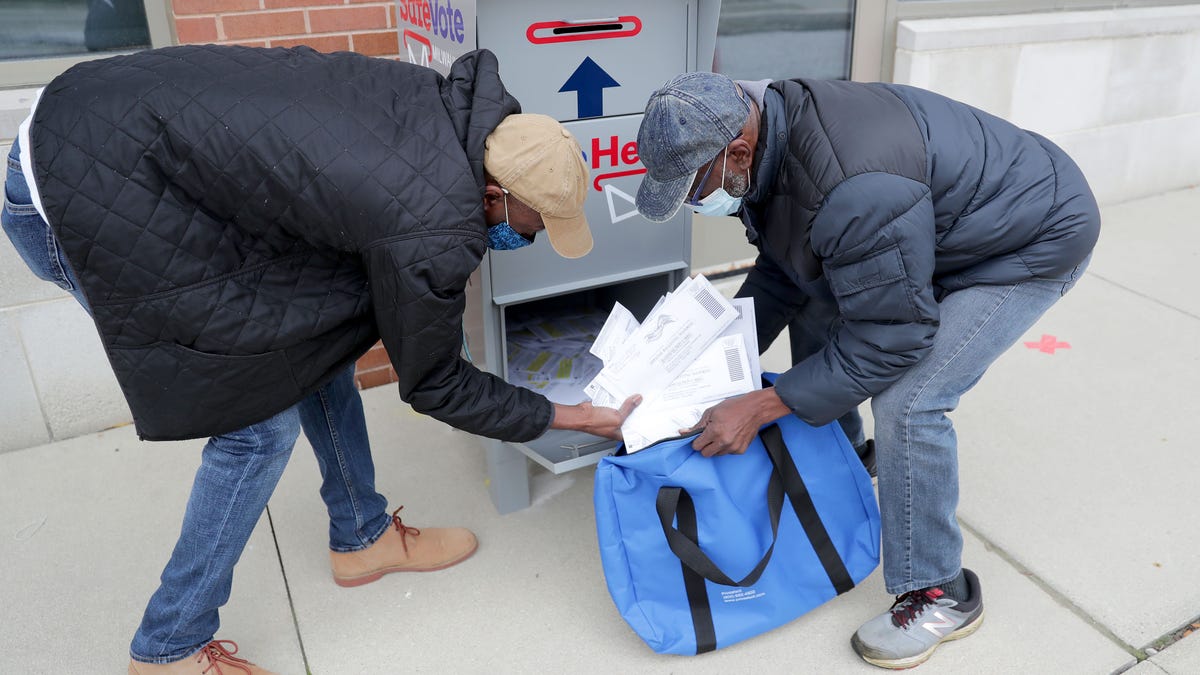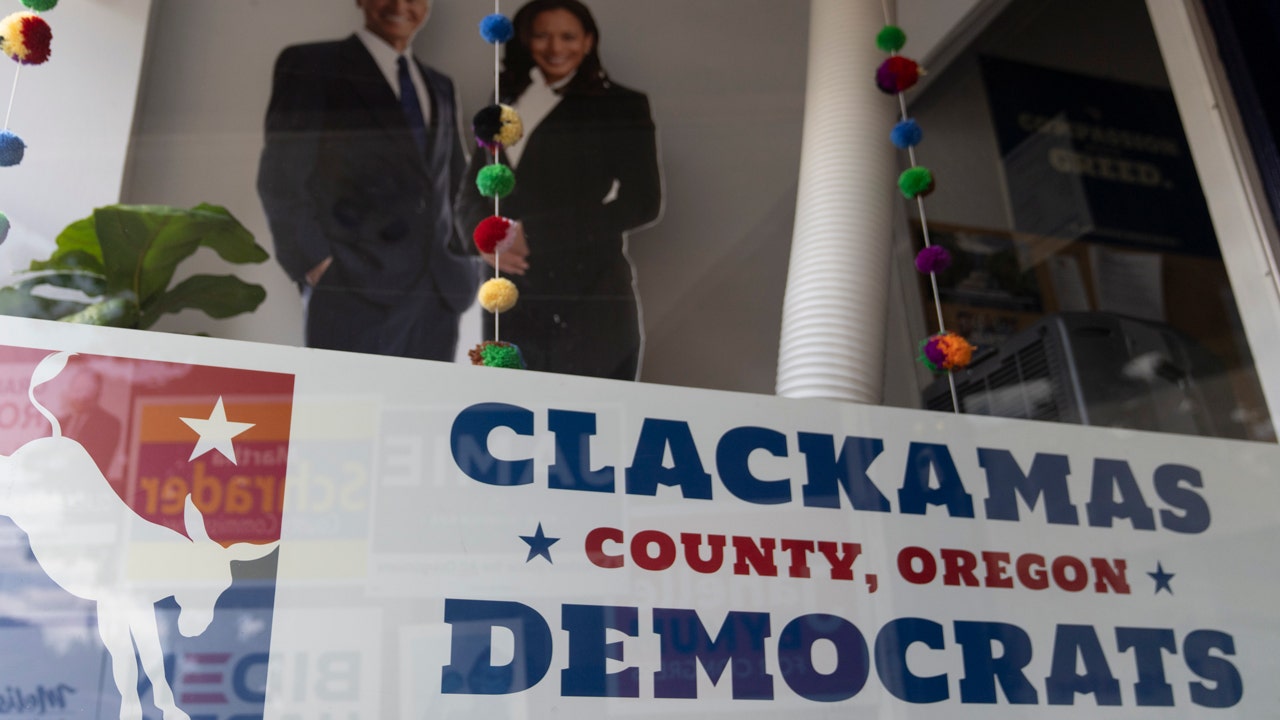The recent history of the Iowa Republican caucus offers the candidates chasing former President Donald Trump one big reason for optimism. But that history also presents them with an even larger reason for concern.
In each of the past three contested GOP nomination fights, Iowa Republicans have rejected the candidate considered the national front-runner in the race, as Trump is now. Instead, in each of those three past caucuses, Iowa Republicans delivered victory to an alternative who relied primarily on support from the state’s powerful bloc of evangelical Christian conservatives.
Read: The GOP primary is a field of broken dreams
But each of those three recent Iowa winners failed to capture the Republican presidential nomination or, in the end, even to come very close. All three of them were eventually defeated, handily, by the front-runner that they beat in Iowa. That pattern played out in 2008 when Mike Huckabee won Iowa but then lost the nomination to John McCain, in 2012 when Rick Santorum won Iowa but lost the nomination to Mitt Romney, and in 2016 when Ted Cruz won Iowa but lost the nomination to Trump. Not since George W. Bush in 2000, and before him Bob Dole in 1996, has the winner of the Iowa caucus gone on to become the GOP nominee.
That record frames the stakes for this round of the Iowa caucus, which will begin the GOP nominating process next January 15. Beating Trump in Iowa remains central to any hope of denying him the nomination. Among Trump skeptics, there is a widespread belief that “Iowa is more crucial than ever, because if Trump wins here, he will be your nominee; he’ll run the table,” as Bob Vander Plaats, the president and CEO of The Family Leader, an Iowa-based social-conservative organization, told me in an interview last week.
But even if Trump is defeated in the caucus, this recent history suggests that he will still be a strong favorite for the nomination if Iowa Republicans do not choose an alternative stronger than Huckabee, Santorum, or Cruz proved to be. The conundrum for the candidates chasing Trump is that the strategy that probably offers the best chance of upsetting him in Iowa—maximizing support among evangelical-Christian conservatives—also creates the greatest risk of limiting their appeal and making it harder to beat him in most later states.
Although focusing on evangelical conservatives can deliver victory in Iowa, “if the campaign you’re running is only aimed at those people … it’s hard to put together a coalition big enough to win” the nomination overall, says Dave Kochel, an Iowa Republican strategist.
As they watched the candidates shake hands at the Iowa State Fair in Des Moines last week, local political observers and national reporters debated the usual questions: Who is collecting the most endorsements? Who has built the strongest grassroots organization? Who has the most supporters passionate enough to turn out on a cold night next January? But the largest question looming for Republicans may be whether the road to success in the Iowa caucus has become a path to ultimate failure in the GOP presidential-nominating process.
The common problem for Huckabee, Santorum, and Cruz was that even on the night they won Iowa, the results demonstrated that the base of support they had attracted was too narrow to win the nomination. Entrance polls conducted of voters heading into the Iowa caucuses found that each man finished well ahead among voters who identified as evangelical Christians. But all three failed to win among voters in Iowa who did not identify as evangelicals.
That math worked in Iowa because evangelical Christians constitute such a large share of its GOP voters—almost two-thirds in some surveys. But each man’s weakness with the Iowa voters who were not evangelicals prefigured crippling problems in other states. The difficulties started just days later in New Hampshire, which has few evangelicals. Huckabee, Santorum, and Cruz were all routed in New Hampshire; none of them attracted as much as 12 percent of the total vote.
The divergent results in Iowa and New Hampshire set the mold for what followed. All three men were competitive in other states with sizable evangelical populations. But none could generate much traction in the larger group of states where those voters were a smaller share of the GOP electorate. In the end, neither Huckabee, Santorum, nor Cruz won more than a dozen states.
Kedron Bardwell, a political scientist at Simpson College, south of Des Moines, says this history makes clear that Iowa Republican voters, especially evangelicals, have never placed much priority on finding candidates that they think can go the distance to the nomination. “I look at those past winners and think voters were saying, ‘We are expressing our conservative Christian values and not so much worrying about what will happen after that,’” Bardwell told me.
Vander Plaats predicts that will change in this election; the eventual failure of these earlier Iowa winners favored by evangelicals, he told me, will make local activists more conscious of choosing a candidate who has the “national infrastructure and capacity to go beyond Iowa.” Yet financial and organizational resources aren’t the only, or perhaps even the most important, measures of which Republican is best-positioned to convert an Iowa win into a lasting national challenge to Trump.
Even if someone topples Trump in Iowa with strong support from evangelicals, the key measure of their long-term viability will be whether they can attract a significant share of non-evangelicals. In fact, according to past entrance polls, the candidate who won the most support among the Iowa voters who are not evangelicals has captured the GOP nomination in all but one contested race since 1996. (The lone exception came in 2008, when John McCain, the eventual winner, did not compete in Iowa, and those voters mostly backed Mitt Romney.)
Kochel told me that the best way to understand the formula that might allow another candidate to overtake Trump in enough states to win the nomination is to consider the candidates who finished just above and behind him in the 2016 Iowa caucus: Cruz and Florida Senator Marco Rubio.
“If you want to put it in 2016 terms, particularly with Trump looming so large, you really need the Cruz-plus-Rubio coalition,” Kochel said. “You need the Santorum/Huckabee/Cruz supporters, Christians as defined by people like Vander Plaats. But then you also need the Rubio coalition: Ankeny soccer moms and old-school Republicans, college-educated non-evangelicals. That’s the coalition that can win a nomination.”
Can any of Trump’s rivals assemble such a coalition to threaten him, in Iowa and beyond? His following in the state remains passionate, as his exultant reception at the state fair last weekend demonstrated. And though he’s campaigned in the state considerably less than his leading rivals, Trump held a big lead in the recent New York Times/Siena poll of Iowa Republican voters. That survey showed Trump leading among evangelicals and non-evangelicals, largely on the strength of a dominant advantage among the likely caucus-goers in both groups without a college degree.
But there may be a bigger group of Iowa Republicans willing to consider an alternative to Trump than polls now indicate. It’s not scientific, but my conversations with likely caucus-attenders at the fair last week found a surprising number expressing exhaustion with him.
Although they liked Trump’s performance as president, and mostly felt that he was being unfairly prosecuted, several told me they believed that he had alienated too many voters to win another general election, and they were ready for a different choice that might have a better chance of beating President Joe Biden. “He did the best he could for four years, but he didn’t win again, and we’re done with it, we’re done,” Mary Kinney, a retired office manager in Des Moines, told me. Later that afternoon, at a Story County Republican Party dinner headlined by Senator Tim Scott, Steve Goodhue, an insurance broker in Ames, looked around the crowded room and told me, “Even though Trump is leading in the polls in Iowa, this shows you people are interested in alternatives.”
Trying to reach those voters ready to move past Trump, Florida Governor Ron DeSantis is putting the most time and money into building a traditional Iowa organization. His campaign staff and the Never Back Down Super PAC that is organizing most of his ground game in the state both include key veterans of Cruz’s 2016 winning caucus effort. DeSantis has committed to visiting all 99 Iowa counties (what’s called a “full Grassley” in honor of the state’s Republican Senator Charles Grassley, who makes a similar tour every year), and his supporters have already recruited caucus chairs in every county as well.
DeSantis has announced endorsements from more than three dozen state legislators, including State Senate President Amy Sinclair. That’s much more than any other candidate. “Look at what the state of Florida has been doing, and look at what the state of Iowa through our legislature has been doing,” Sinclair told me, citing parental rights, school choice, cuts in government spending, and a six-week ban on abortion. “We’ve been working on all of the same things, so when Governor DeSantis steps into the presidential race and says, ‘I have a vision for the nation, and that vision is what we’ve done in Florida,’ well, that’s the same vision that the folks in Iowa have had.”
Many leading Iowa social conservatives also appear likely to coalesce around DeSantis. Steve Deace, an Iowa conservative-media commentator, endorsed him earlier this month, and in our conversation, Vander Plaats seemed headed that way too. Each had backed Cruz in 2016.
All of this shows how many Iowa Republican power brokers consider DeSantis the most likely to become the principal alternative to Trump. DeSantis also polled second to Trump in that New York Times/Siena Iowa survey. But my conversations at the fair failed to find anyone particularly interested in him. Several of those looking for options beyond Trump said they found DeSantis too much like the former president in his combative temperament and style.
Craig Robinson, the former state Republican political director, says he believes that DeSantis, by running so hard to the right on social issues, has already boxed himself into the same corner as Huckabee, Santorum, and Cruz, with little chance to reach out beyond evangelicals to the economically focused suburban Republicans who liked Rubio and Romney. When DeSantis entered the race, Robinson says, he could have appealed to “the Republicans who are sick of the bullshit and don’t want all the extras that come with Trump. Then he’s run a campaign about Disney and all this woke stuff, and all he’s done is make himself as controversial as Trump.”
Helen Lewis: The humiliation of Ron DeSantis
DeSantis’s positioning has created an opening among the Iowa Republicans uneasy about Trump that Tim Scott looks best positioned to fill. The senator may be developing a more effective formula than DeSantis for appealing to both evangelical social conservatives and more socially moderate, suburban economic conservatives. Unlike DeSantis or former Vice President Mike Pence, Scott doesn’t hammer away at social issues in a way likely to alienate suburban Republicans. Instead, he connects with evangelical Republicans through his testimony about the importance of religious faith in his own life, and the way in which he organically and authentically weaves Bible phrases into his conversation. As several Iowa Republicans told me, Scott “speaks evangelical” in a way DeSantis does not.
Still, Scott’s campaign message so far is bland, focused primarily on his personal story of ascending from poverty. The senator’s unwavering refusal to challenge or criticize Trump has left the impression among some activists that he is really running for vice president. So long as Scott fuels that perception by refusing to contrast himself with Trump, Vander Plaats predicted, “his poll numbers will not move, and his caucus support will not be there.”
The caucus is now less than five months away, but in earlier years, this final stretch often produced rapid shifts in fortune. Bardwell, the political scientist, notes that five different candidates led polls at some point leading up to the 2012 caucus before Santorum finally edged past Romney at the wire. Iowa social conservatives have frequently coalesced behind their favorite late in the race. The choice those evangelical Christian voters make this winter will likely determine whether Iowa sets Trump on an unstoppable course to another nomination or anoints an alternative who might seriously challenge him.































